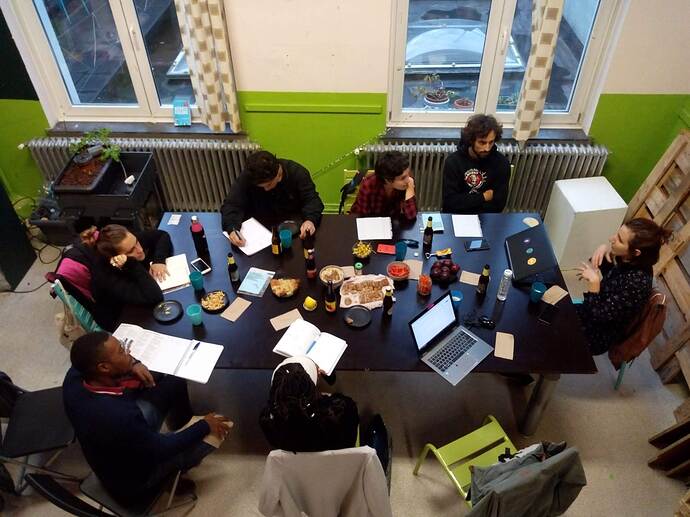10 of us people gathered earlier this week to figure out the ins and outs of vacancy and potential for spaces in the city to be transformative.
Many of us were coming from activist spaces or working for alternative social systems, outside of Belgium - in Italy, Spain, Croatia, or internationally. We were happy to have two experts: @BaobabUrbain (working with Toestand at AlleeduKaai and Edgeryders at The Reef) and Victor from FEBUL - Fédération Bruxelloise de l’Union pour le Logement. Both of them are walking encyclopedias and together they know the civic/institutional scene very very well.
Some of my raw reflections here, I hope they can be helpful in continuing to think about the issue.
- The Belgian law is not ready yet for sustainable occupations that lead to innovation, even though several organisations have professionalized in taking over, activating and maintaining spaces - like Communa and Toestand.
- Even in the non-profit scene, there is a difference between access to spaces and making them a social innovation engine. Often, the orgs who get spaces become experts, like real estate agents, but they dont have capacity to engage many more in the community service, for example in what the space can do for the neighborhood. This is a self-fulfilling gap: the organisations need to access more and more spaces to make their ends meet, because with the space they get resources for 1 person on a payroll to manage/host the space for a year. In the principle of economies of scale, they need more spaces to get going, but the lack of capacity for social innovation is severe and doesn’t get solved with just access to space.
- People talk about the need to build ecosystems, but in practice this is difficult. La Buissonnière, for example, where we were hosting the workshop, is a former school. Now the commune of St Gilles gives the access to Communa ASBL. It’s rented, sharing space with other “porteurs de projets”, social innovations “startups”, and on the first floor people are actually living. The startups or other collectives coming in cannot open themselves that much to the outside community.
Ways forward could be pursued around the following:
- More collaboration. There are actors in a “comfort zone”, but we need to go out of it if we want to use occupations for social change. There’s a need to be going for calls for proposals together with other social actors.
- Collective advocacy, like Brussels St Vide - Leegbeek needs to focus on content, not just the media message of ‘there are unused spaces!’. All the actors where asking the same question: what to do next? Cooperative governance, discourse of an additional commune - the idea of coming together. We developed positions: non profit projects, cultural, sustainable and social but also new relationship with policy makers - an advocacy tool for policy makers, to learn where are the gaps in the law and to make proposals.
- Operational advocacy, in which organisations like FEBUL can engage in, by developing stuff such as L’Observatoire - an interactive map of occupations in Brussels. They can help the political actors have instruments they can show later, in the spirit of ‘we have your back’ for new policy making.
Thank you Marta, Marina, Nora, David, Alex, Cassiopee, Victor and all for joining! What are your take-aways and what would you need groups like ours to support you with?
PS If you want to help host the next culture Culture or bring a project to discuss, related to communities changing culture in the city, let me know!
